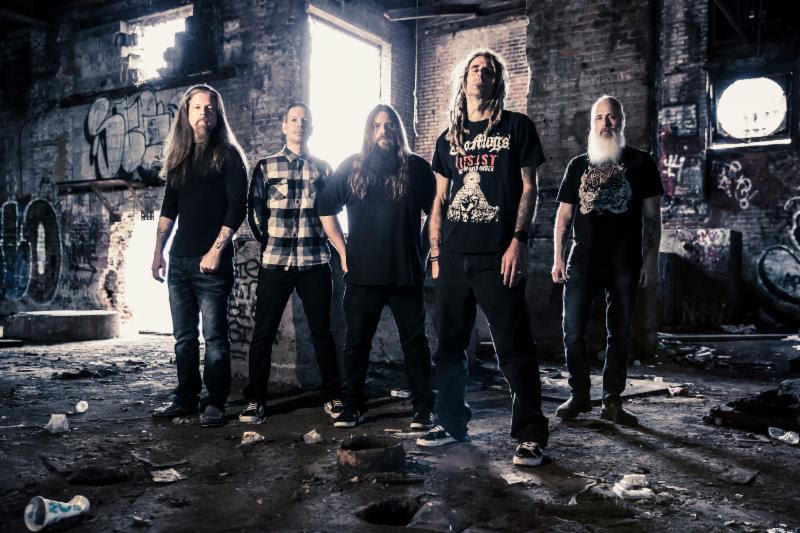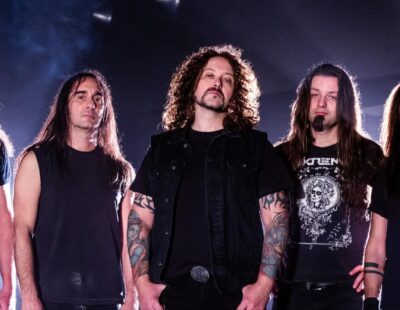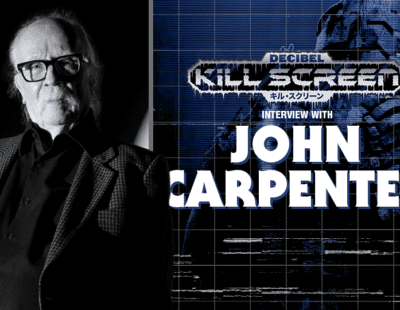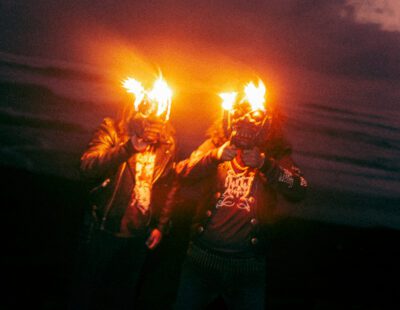
Burn the Priest‘s Legion: XX covers album drops May 18 on Epic Records. To celebrate, Decibel reveals the previously untold history of the pre-Lamb of God outfit in our May 2018 issue (order here). Here’s an exclusive excerpt from the cover story detailing frontman Randy Blythe’s decision to join the BTP ranks in the mid-1990s.
In the waning days of summer 1995, Randy Blythe at long last set his boots back down on the dirt of Richmond, Virginia’s West End after a couple years riding freight trains across the country. He dropped a then-precious dime at the nearest payphone and called the only guy he knew with a car, Abe Spear. The pair had met several years previous while neighbors in Oregon Hill—a working-class neighborhood bordering Virginia Commonwealth University with rents low enough to attract a mix of artists, students and blue-collar workers—and played together in an ill-fated band called Furious George.
“We were a complete train wreck,” Blythe tells Decibel. “The drummer wanted to be in Smashing Pumpkins, the bass player wanted to be Charles Mingus, Abe wanted to be Jimi Hendrix and I wanted to be in Bad Brains. It was awful. I was not a good vocalist at all.”
As they rode through River City, Spear invited Blythe to a party that night to check out his new band. “Killer,” Blythe thought, the anticlimactic fury of George casting a long shadow over his expectations. “Free beer.”
Unbeknownst to Blythe, however, the band that his old friend had joined in his absence—a continually evolving instrumental extreme metal outfit conceived in the VCU dorms circa 1990 by guitarist Mark Morton, drummer Chris Adler and bassist John Campbell, and now solidified under the fittingly heretical moniker Burn the Priest—was slaying motherfuckers.
“My first experience with Burn the Priest was at a house party near VCU campus,” recalls former Avail drummer/ex-Alabama Thunderpussy guitarist Erik Larson. “They were instrumental at the time. Had Abe and [future RPG guitarist] Matt Conner playing guitar for them. They were amazing. Super energetic and intense. I remember thinking they’d be pretty unstoppable when they got a singer. I knew [bassist John] Campbell from the dorms, and Matt and I had been in Kilara together, but it was my first time really seeing Chris [Adler] play the kit in front of me. Richmond has always had a ‘Put up or shut up’ kinda vibe as far as being in a band. It’s a little big town and most folks in bands know each other or of each other. It seems like everyone is in a band, so consequently people are not impressed by the fact that you’re in a band, so you have to be good or no one will give you the time of day. They were very good. Basically, almost none of the dudes involved would have been expected to be in a band like Burn the Priest at that time, so it was really an eye opener. I mean, Chris was in [emo-y alt-rockers] Jettison Charlie, for fuck’s sake!”
Adler wasn’t the only one in the ranks possessing an un-kvlt background.
“Personally, I didn’t listen to a lot of heavy metal growing up—or really until I got to college and met the people that eventually would become Burn the Priest,” Campbell says. “I came from punk rock. Back in the day, there was much more of a gap between the two. You either listened to metal or punk.” This genre wall began to come crumblin’ down when Adler blasted …And Justice for All at Campbell through a bass rig in the dorms.
“That was the moment when I fell in love with Metallica,” the bassist says, adding with a chuckle: “I’ve said this before, and some smartasses on the internet said, ‘Oh, sure. The bass player’s gonna mention the Metallica record with no bass on it.’ Whatever. That’s an amazing record, amazingly well written, and still one of my favorite Metallica records.”
When Adler soon thereafter suggested starting a heavy metal band, Campbell was all in—not just for the love of the music, but also for the contrarian weirdness of jumping into a style at its nadir in 1994. Spear underwent a similar indoctrination process.
“Mark Morton was one of those guitar virtuosos—you know, a high-school dude who won the battle of the bands and could play like ‘Eruption’ and knew all the Metallica songs,” he says. “Then you had Chris Adler, who was into Meshuggah and even back then was like this really powerful machine—he always had the smallest snare he could get so it cut over the top of everything and he would just whale on the double kick drums. For someone like me who never really learned any Metallica tunes and was more into Sub Pop, Nirvana and I guess what you’d generally label indie music, it was a crazy, inspiring, exciting atmosphere to find myself in. I found out I just really loved playing super fucking heavy, heavy metal, which was this unexpected, awesome realization.”
Indeed, the fledgling band’s sound had been created via—to use an associated future parlance—a wall-of-death-esque smashing of influences that nonetheless remained one free radical short of a more profound mutation.
Which brings us to the fateful house party.
“I walked in and the band was just ripping,” Blythe recalls. “They were a three-piece at that time. It was Abe, John and Chris. Mark had gone to Chicago to get his master’s degree in political science or something. I was like, ‘Holy shit! These guys are great!’ And they were loud as fuck. The cops came. I remember the cops were shining this light in through the windows of the garage and saying, ‘Stop the music!’ But those guys didn’t stop playing. They just hunkered down as if the cops wouldn’t see them. They literally got lower beneath the beams of the cops’ lights and just kept playing.”
“That is punk as fuck,” Blythe said to his then-girlfriend. “That’s the band I’m going to sing for.”
“Whatever, Randy,” she replied.
Undaunted, he wrote lyrics to a boombox practice tape Spear provided. A week later, Blythe was belting out “Duane” with the band.
“The guy’s a natural frontman,” Spear says. “He was a smart dude; he read a lot and was a really brilliant writer, and when it came to putting himself out there, and going to those dark places, he just did not give a fuck what anyone thought. It immediately clicked.”
Read the full Burn the Priest cover story in Decibel’s May 2018 issue (order here).







